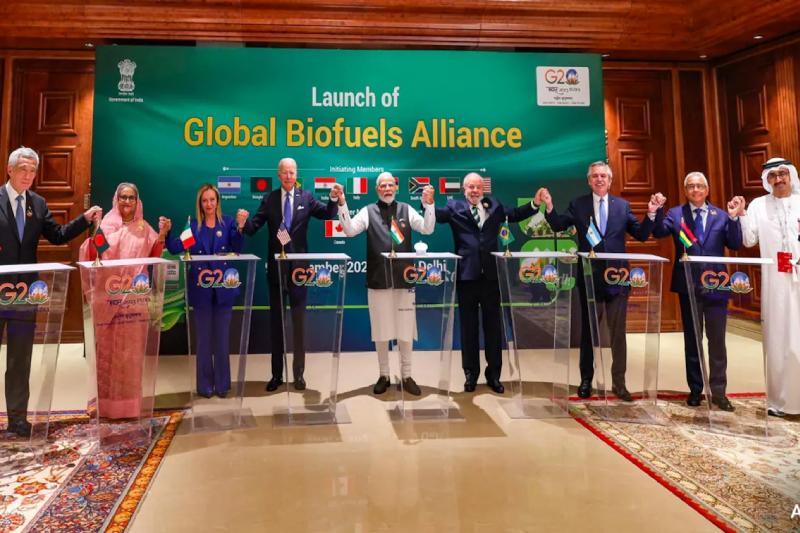Global Biofuels Alliance
At the G20 Summit on Sept. 9, India launched the Global Biofuels Alliance through Prime Minister Narendra Modi.
The alliance, launched by Modi along with a number of global leaders including U.S. President Joe Biden, Brazilian President Lula da Silva, Bangladeshi Prime Minister Sheikh Hasina and Italian Prime Minister Giorgia Meloni, call for increasing the blending of ethanol with gasoline to 20 percent globally.
In addition to India, initiating members include Argentina, Bangladesh, Brazil, Italy, Mauritius, South Africa, the United Arab Emirates and the United States. Timely contributors include countries such as Canada, South Africa, Singapore, Iceland, Kenya, Guyana, Paraguay, Seychelles, Sri Lanka, Uganda and Finland.
With the World Bank, the Asian Development Bank, the World Economic Forum, the World LPG Organization, the United Nations, UNIDO, the Biofutures Platform, the International Civil Aviation Organization, the International Energy Agency, the International Energy Forum, the International Renewable Energy Agency and the World Biogas Association, the Global Biofuels Alliance is supported by a variety of international organizations.
“The launch of the Global Biofuels Alliance marks a turning point in our pursuit of sustainability and clean energy. I thank the member countries that have joined this alliance,” Modi said.
Earlier, in his speech at the G20 One Earth Summit, Prime Minister Modi also proposed the launch of the “G20 Satellite Mission for Environment and Climate Observation” and urged leaders to begin work on the Green Credit Initiative. “Today, the need of the hour is for all countries to work together on fuel blending. Our proposal is to take an initiative at the global level to increase ethanol blending in gasoline up to 20 percent,” he said.
“Alternatively, we could work to develop a different blending mix for the greater global good that ensures stable energy supply while contributing to climate security,” Modi said at the meeting, which was attended by U.S. President Biden and Saudi Arabia’s Crown Prince Mohammed bin Salman and British Prime Minister Rishi Sunak among others. Prime Minister Modi said the energy transition is an important necessity for the 21st century world given the challenge of climate change. He said trillions of dollars were needed for an inclusive energy transition and that developed countries would play a crucial role in this.
“Together with India, all countries in the global South are pleased that developed countries have taken a positive initiative this year, in 2023. For the first time, developed countries have expressed their willingness to fulfill their pledge of $100 billion for climate finance.” he said.
According to a White House statement, President Biden has made the alliance toward clean energy, one of his administration’s top priorities. “Addressing the climate crisis requires global action, and while in New Delhi for the G20 Summit, President Biden continued to build innovative partnerships as part of a global effort to combat climate change,” it said.
The Alliance, the White House release said, is focused on ensuring the supply of biofuels and that those biofuels remain affordable and are produced sustainably.
“The founding members of the Alliance will continue to reach out to other countries committed to these shared values and engage countries in this effort,” it said.
Prime Minister Modi said “a global biofuels alliance among members of the Group of 20 largest economies will help accelerate the use of sustainable biofuels to support the global energy transition. Such alliances aim to create opportunities for developing countries to advance their energy transition. Biofuels are important from a circular economy perspective. Markets, trade, technology and policy – all aspects of international cooperation – are critical to creating such opportunities.”
Biofuel is a renewable energy source derived from biomass. India imports more than 85 percent of its crude oil needs. To reduce its dependence, India is gradually building capacity to produce fuel from crop residues, plant waste and municipal solid waste.
The goal of the Global Biofuels Alliance is to facilitate collaboration and increase the use of sustainable biofuels in all sectors, including transportation. The focus is primarily on strengthening markets, facilitating global biofuels trade, and developing concrete policies knowledge exchange and providing technical support for national biofuels programs, worldwide!
Even the International Energy Agency (IEA) estimates that global production of sustainable biofuels would need to triple by 2030 to put the global energy system on a path to net-zero emissions by 2050. Liquid biofuels already supplied more than four percent of total energy supply in the transport sector in 2022.

